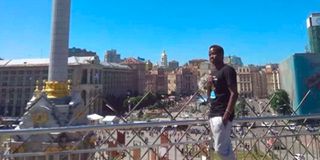Fearless Kenyan who went back to Ukraine despite war

Sam Eru. He says he returned to war torn Ukraine because he is from Turkana and has known conflict all his life.
What you need to know:
- Sam Eru says he returned to war torn Ukraine because he is from Turkana and has known conflict all his life.
- Eru, who speaks Ukranian, says his employer is supportive, and that he is in the country legally.
On February 24, 2022, Russia launched an invasion of neighbouring Ukraine. The war is said to have forced more than eight million people to flee the country.
As early as April 2022, some took the decision to return to Ukraine – as shown in a report by the International Organisation for Migration in January this year.
Sam Eru, a Kenyan who had been living in Ukraine, was among those who left but is back in the country.
According to a study by the Norwegian Refugee Council, more than 4.7 million people displaced by the war have returned to Ukraine, citing many reasons, including family reunifications and children’s education.
But the conflict is far from over, with parts of the country under Russian occupation as Ukrainian forces continue to push back.
Also Read: How Kenyan climber conquered Mt Everest
As of May 1, the UN Office of the High Commissioner for Human Rights had recorded 23,375 civilian casualties in Ukraine – some 8,709 killed and 14,666 wounded.
Eru, who spoke to the Sunday Nation from Ukrainian capital Kyiv, narrated how he fled and why he eventually returned.
“On the day the war started, I was woken up by explosions. I listened to the news. Then a friend, who was really worried, called. It was surprising that this could happen in Europe. But I wasn’t in a hurry to get out of country,” Eru said.
“I wanted to evaluate how the war would affect my life. I am from Turkana, so I have known conflict all my life. Safety was not of much a concern to me at the time.”
Eru eventually left the country nine days after the start of the war. He says what was happening affected him a lot. He cried, not because of the war, but the helplessness people find themselves in during such times.
“Some acquaintances in Germany asked me to go there. I found out online that one could leave the country by train through Hungary, which was less crowded at that time,” Eru says.
“I took a taxi to the station and paid 10 times the usual fare.”
At the border, he and others waited for three to four hours before crossing. It was easy to travel to Germany after crossing over.
Eru was in Berlin for almost two months. His German hosts wanted him to stay longer but relatives kept calling.
“I assured them that I was fine. Actually, the ordeal put me on a path of self-development and understanding human nature better,” he says.
“My rented apartment was intact when I returned to Ukraine. It still is. There were fewer blasts and I knew Russia only targeted military infrastructure and power stations. I live in a civilian area.”
“There are civilian casualties at times but I believe it happens by accident and that makes me calm. There were times we did not have power and water but the infrastructure was usually repaired within 24 hours.”
Eru and his neighbours heard blasts around 3am sometime last week. He says moving around is not difficult, except when air raid alerts sound.
“Some bridges have been shut and the metro doesn’t ferry people across the river,” he says.
Eru flew to Ukraine in December 2011 as a student. He did his undergraduate and graduate studies in the country and got a job in the final year of his Master’s degree.
“I have been working from home since the pandemic in 2020. Now, there is an option to go back to the office. I do so once in a while. I work in tech support,” he says.
“I did not fly back to Kenya because I have built a life in Ukraine and felt I had some unfinished business here.”





